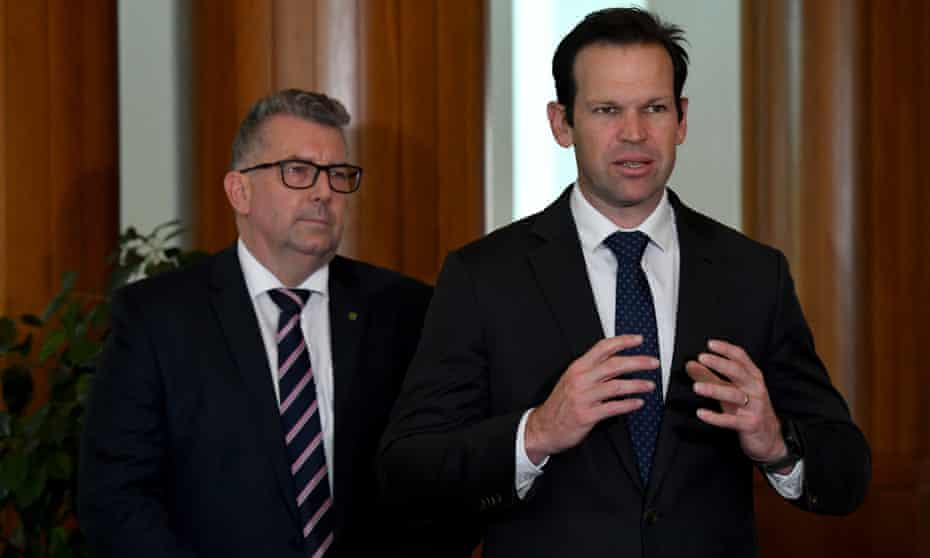The Nationals’ climate position has become symbolic posturing and no longer represents Australian farmers
The party line of the bush ‘footing the bill’ for the nation’s emissions reduction is a false narrative

The narrative of the beleaguered farmer runs deep in the national psyche. It’s one often weaponised to berate pampered city slickers who don’t understand what life in the bush – what real life – is about.
The National party has come up with a new twist on the old grievance – farmers have been paying for Australia’s emission reductions while city folk have been luxuriating in the benefits.
Nationals senator Matt Canavan gave it a try out in an interview with Alan Jones in July. It’s the cities that are responsible for carbon emission, he said, but “it’s the bush that’s expected to pay”. Egged on by Jones, who believes accepting net zero by 2050 would be “a national economic suicide note”, Canavan claimed that “the cities have sent their guilt bill, their guilt invoice to the bush”.
The Nationals agriculture minister, David Littleproud, has this week voiced the same argument to justify the junior Coalition’s partner’s stubborn resistance. Speaking for regional communities, he said “last time we footed the bill and we’re not going to do it again”.
What could this possibly mean? There was no “last time”. Littleproud seems to be referring to the long-term decline in land-clearing, which has had the effect of bringing down Australia’s total greenhouse gas emissions.
If we exclude emissions arising from land clearing and deforestation, like other developed nations, Australia’s fossil fuel emissions have been rising almost continuously since the beginning of the century, while those of the US, Europe and Britain have been falling.
The Australia clause
The widening of the emissions gap between us and the rest of the developed world has been masked by the inclusion of a loophole in the Kyoto protocol that for 24 years has allowed Australia to carry on a fraud against the rest of the world.
Carbon emissions from land clearing and deforestation spiked in 1990, the base year for the Kyoto protocol, and again in 2005, the base year for the Paris agreement, allowing Australia to count large reductions in emissions unrelated to climate policy towards our international obligations.
While other nations have been cutting emissions by closing coal-fired power plants and promoting electric vehicles, here it’s been a by-product of state biodiversity protection regulations and changing conditions in the beef market.
It was this accounting trick that Greg Hunt, as environment minister, exploited to claim, ad nauseam, that Australia would “meet and beat” our Kyoto targets. The implication that Australia deserves plaudits for taking climate change seriously is a lie because meeting our commitments involved the Australian government doing virtually nothing.
It’s more than a lie because it traduces other nations that have actually been trying much harder than we have. Overseas, everyone involved in climate policy knows about the impact of the Australia clause, so the “meet and beat” boast only aggravates them further.
By claiming that declines in land clearing emissions amount to the bush “footing the bill”, the Nationals have turned a national boast into another rural whinge.
The Nationals resources minister, Keith Pitt, has extended the argument further. Farmers have been forced to give up their “property rights” to meet the climate demands of the cities not only by limits on land clearing but by regulations forcing them to reduce toxic run-off into the Great Barrier Reef. But that’s a reef protection measure, not a climate change measure.
In Pitt’s brain, it doesn’t seem to matter. It’s all a push by soft-handed city dwellers to extract more blood from the honest toilers on the land.
Nationals v farmers
The story being told by Canavan, Littleproud and Pitt has a couple of awkward inconsistencies.
First, in the New South Wales parliament the National party has agreed to a far-reaching energy transformation policy, including net zero by 2050 and a 50% reduction by 2030. The former NSW Nationals leader John Barilaro spruiked the benefits to regional communities.
This suggests that within the National party itself there is no in-principle objection to reducing Australia’s emissions in line with international expectations. So the big beasts in Canberra are engaged in symbolic posturing.
Second, while National party leaders are happy to claim the mantle of the farmers’ friend when it suits them, the National Farmers’ Federation and peak bodies representing grain growers and red meat producers have embraced the net zero by 2050 goal and are committed to big cuts in emissions by 2030.
This is embarrassing for the Nationals. Canavan attributes the NFF’s betrayal to the desire of its leaders to keep receiving “invitations to the latest dinner party in Sydney”.
The gap between farmers and the National party has never been wider. The position now being put by the federal National party no longer represents farmers; it echoes the more reactionary elements of the mining industry, such as Gina Rinehart.
Barnaby Joyce has ruled out an ambitious target for 2030, the entry ticket for serious players at Glasgow. Scott Morrison will not get any pats on the back at Cop26 without a credible 2030 target. Our prime minister’s “best hope” is that China will torpedo the whole thing, diverting attention from Australia and allowing the prime minister to say “See, there’s no point in Australia going out on a limb.”
A godsend for Morrison; a catastrophe for the Earth.
-
Clive Hamilton is professor of public ethics at Charles Sturt University in Canberra and the author of five books on climate change.
